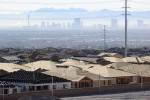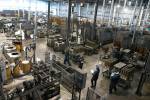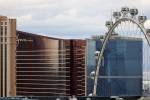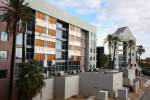Economists weigh in on next recession’s impact on Las Vegas
It’s been 10 years since the collapse of the Lehman Brothers financial services firm. The company’s bankruptcy filing on Sept. 15, 2008 greatly intensified the financial crisis and still holds the record as the largest bankruptcy in U.S. history.
Las Vegas was thousands of miles away from the chaos on Wall Street, but the city was among those hit hardest in the Great Recession, largely because of an economy overly reliant on tourism and construction.
The city has recovered since, but 15 out of 21 economists surveyed by the Review-Journal say it’s possible the next recession will hit within the next three years. Data show the makeup of the state’s economy has hardly changed.
The next recession
Las Vegas was still feeling the effects of the recession when it officially ended in June 2009. The Bureau of Labor Statistics reported unemployment rates at a staggering 11.3 percent in Nevada. Visitor volume dropped more than 2.8 million people between 2007 and 2009, according to the Las Vegas Convention and Visitors Authority.
One 2010 study from the Brookings Institution and London School of Economics ranked Las Vegas as the metropolitan area with the fifth-worst economy in the world.
Nevada’s economy has rebounded and is continuing to grow.
In February, Nevada was named the fastest job-producing state in the country by the U.S. Labor Department. And the median household income was $55,431 in Nevada in 2016, compared to $51,434 in 2009, according to the U.S. Census Bureau.
If the economy keeps expanding past July 2019, this will be the longest recorded period of growth in history.
“Some economists think that because the expansion’s been so long that we’re due for (another recession),” said Stephen Miller, director of the Center for Business and Economic Research at UNLV. But “length isn’t a signal of a recession. Something has to cause each turn.”
Multiple factors — both political and economical — could be the tipping point that leads the nation into a recession.
“The recession is coming. They always do. … (But) it’s all guesswork,” said John Restrepo, principal of Las Vegas-based RCG Economics. “When you introduce things like large-scale trade wars and any kind of real wars, I think some of what you’re seeing with economists is a level of uncertainty beyond 2020.”
He believes energy prices, interest rates and fiscal policies under President Donald Trump could all be significant factors.
For example, the fiscal stimulus from the $1.5 trillion tax cuts Trump signed in December is expected to wear off around 2020, making it a “high risk” year, said Jonathan Wright, an economics professor at Johns Hopkins University in Baltimore.
The odds of a recession in any one year are low, but the waning fiscal stimulus “will boost GDP in 2018 and 2019, tightening monetary policy and potential for trade wars,” Wright said in the survey.
Elliott Parker, an economics professor at the University of Nevada, Reno, believes it’s unlikely a recession will hit within the next year, but said it’s hard to predict what the future has in store.
“What will likely set off the next recession will be some unexpected event,” he said in an email. “A trade war could do it, a Mideast war, or a significant rate hike by the (Federal Reserve)… the Nevada economy will largely be driven by what is going on in the nation as a whole.”
Other factors pointed out by 21 economists in a Review-Journal survey include increased interest rates, an aging population, student loan debt, household debt and asset bubbles in areas like real estate and stock prices.
Impact on Las Vegas
Restrepo said it’s unlikely Las Vegas’ economy will plummet like it did in the last recession.
“It was a near collapse of a global economy. So that’s a once-in-a-lifetime kind of event,” he said. “Most recessions are not that deep and long.”
But Nevada’s economy hasn’t changed much since 2008.
“Our economy was based on discretionary spending by visitors,” Restrepo said.
And it still is.
The leisure and hospitality made up about 26.5 percent of the state’s average employment in 2017, only slightly lower than the 26.6 percent in 2006, according to data from the Nevada Department of Employment, Training and Rehabilitation.
When people feel uncertain about spending money, “one of the first things they cut out are discretionary items: vacations, going out to dinner, going out to a movie, shopping. Everything Vegas is,” Restrepo said.
Nevada has made strides in diversifying its economy since 2008: The city is less reliant on construction work, with employees making up 6.3 percent in 2017 compared to 11.2 percent in 2006. Employment in manufacturing has been growing for seven years, up from 37,885 jobs in 2010 to 47,677 jobs in 2017. According to data from Nevada Department of Employment, Training and Rehabilitation, the education and health services industry made up about 16.2 percent of total employment in Nevada in 2017, after only 12.7 percent in 2006.
“We’ve become more diversified, and we’re moving along at a moderate pace for economic diversification and development,” Restrepo said. “It just takes a long time to change an economy.”
Restrepo said that as long as Las Vegas has an economy driven by visitors’ discretionary spending, it will have an above-average risk during economic downturns.
Related: Las Vegas businesses should prepare for next recession, expert says
Contact Bailey Schulz at bschulz@reviewjournal.com or 702-383-0233. Follow @bailey_schulz on Twitter.






































